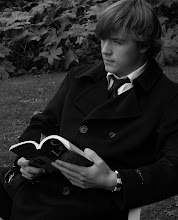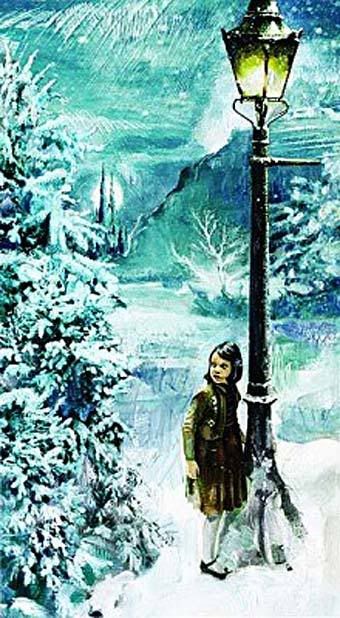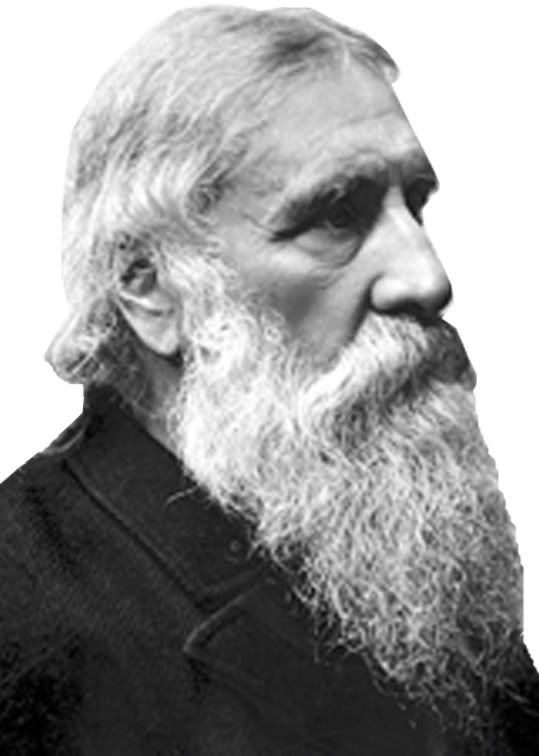Wednesday, September 12, 2007
Pity vs. Passion
Pity sees suffering and wants to ease the pain; passion sees injustice and wants to settle the score.
Tuesday, September 11, 2007
An Untamed Mind
I find God everywhere I go, I can't escape him. Everything reminds me of his existence. All creation was breathed into existence from his imagination. What a wild heart he has. Only someone truly fierce and untamed could have thought up the stars. He is so full of existence...
"In order that we finite beings may apprehend the Emperor He translates His glory into multiple forms-into stars, woods, waters, beasts, and the bodies of men." - Lewis
"In order that we finite beings may apprehend the Emperor He translates His glory into multiple forms-into stars, woods, waters, beasts, and the bodies of men." - Lewis
Monday, September 10, 2007
Eucatastrophe
"At the core of every great adventure story, there has to be a sense of catastrophe and eucatastrophe, and the eucatastrophe has to be stronger than the catastrophe. Christ is the eucatastrophe of all time. There's something catastrophic about Him, He's scandalous, He breaks every expectation, He does everything not the way we expect. He is the eucatastrophe of all time. But where as in our stories, our eucatastrophe are imaginative, He is true." -Tolkien
(This is the conversation that turned C.S. Lewis over to Christ)
"...but where sin increased, grace abounded all the more."
(Romans 5:20b ESV)
Do you believe that?
Your whole worldview will depend on whether you believe that or not.
(This is the conversation that turned C.S. Lewis over to Christ)
"...but where sin increased, grace abounded all the more."
(Romans 5:20b ESV)
Do you believe that?
Your whole worldview will depend on whether you believe that or not.
The Intelligence of a Fool
In order for anyone to become truly intelligent, they need to realize first that they are a fool. Once they’ve realized this, they can move on and not have to worry about looking like one. “A fool thinks himself to be wise, but a wise man knows himself to be a fool. –(Shakespeare)
Wednesday, September 5, 2007
The Garden of the god
She found Michael Moon standing under the garden tree, looking over
the hedge; hunched like a bird of prey, with his large pipe hanging down
his long blue chin. The very hardness of his expression pleased her,
after the nonsense of the new engagement and the shilly-shallying
of her other friends.
"I am sorry I was cross, Mr. Moon," she said frankly. "I hated you
for being a cynic; but I've been well punished, for I want a cynic
just now. I've had my fill of sentiment--I'm fed up with it.
The world's gone mad, Mr. Moon--all except the cynics, I think.
That maniac Smith wants to marry my old friend Mary, and she--
and she--doesn't seem to mind."
Seeing his attentive face still undisturbedly smoking, she added smartly,
"I'm not joking; that's Mr. Smith's cab outside. He swears he'll
take her off now to his aunt's, and go for a special licence.
Do give me some practical advice, Mr. Moon."
Mr. Moon took his pipe out of his mouth, held it in his hand
for an instant reflectively, and then tossed it to the other side
of the garden. "My practical advice to you is this," he said:
"Let him go for his special licence, and ask him to get another
one for you and me."
"Is that one of your jokes?" asked the young lady.
"Do say what you really mean."
"I mean that Innocent Smith is a man of business,"
said Moon with ponderous precision--"a plain, practical man:
a man of affairs; a man of facts and the daylight.
He has let down twenty ton of good building bricks suddenly
on my head, and I am glad to say they have woken me up.
We went to sleep a little while ago on this very lawn, in this
very sunlight. We have had a little nap for five years or so,
but now we're going to be married, Rosamund, and I can't see
why that cab..."
"Really," said Rosamund stoutly, "I don't know what you mean."
"What a lie!" cried Michael, advancing on her with brightening eyes.
"I'm all for lies in an ordinary way; but don't you see that to-night
they won't do? We've wandered into a world of facts, old girl.
That grass growing, and that sun going down, and that cab at the door,
are facts. You used to torment and excuse yourself by saying I
was after your money, and didn't really love you. But if I stood
here now and told you I didn't love you--you wouldn't believe me:
for truth is in this garden to-night."
"Really, Mr. Moon..." said Rosamund, rather more faintly.
He kept two big blue magnetic eyes fixed on her face.
"Is my name Moon?" he asked. "Is your name Hunt? On my honour,
they sound to me as quaint and as distant as Red Indian names.
It's as if your name was `Swim' and my name was `Sunrise.' But our
real names are Husband and Wife, as they were when we fell asleep."
"It is no good," said Rosamund, with real tears in her eyes;
"one can never go back."
"I can go where I damn please," said Michael, "and I can carry
you on my shoulder."
"But really, Michael, really, you must stop and think!"
cried the girl earnestly. "You could carry me off my feet, I dare say,
soul and body, but it may be bitter bad business for all that.
These things done in that romantic rush, like Mr. Smith's, they--
they do attract women, I don't deny it. As you say, we're all
telling the truth to-night. They've attracted poor Mary, for one.
They attract me, Michael. But the cold fact remains:
imprudent marriages do lead to long unhappiness and disappointment--
you've got used to your drinks and things--I shan't be
pretty much longer--"
"Imprudent marriages!" roared Michael. "And pray where in earth
or heaven are there any prudent marriages? Might as well talk
about prudent suicides. You and I have dawdled round each other
long enough, and are we any safer than Smith and Mary Gray,
who met last night? You never know a husband till you marry him.
Unhappy! of course you'll be unhappy. Who the devil are you
that you shouldn't be unhappy, like the mother that bore you?
Disappointed! of course we'll be disappointed. I, for one,
don't expect till I die to be so good a man as I am at this minute--
a tower with all the trumpets shouting."
"You see all this," said Rosamund, with a grand sincerity in her solid face,
"and do you really want to marry me?"
"My darling, what else is there to do?" reasoned the Irishman. "What other
occupation is there for an active man on this earth, except to
marry you? What's the alternative to marriage, barring sleep?
It's not liberty, Rosamund. Unless you marry God, as our nuns do in Ireland,
you must marry Man--that is Me. The only third thing is to marry yourself--
yourself, yourself, yourself--the only companion that is never satisfied--
and never satisfactory."
"Michael," said Miss Hunt, in a very soft voice, "if you won't talk so much,
I'll marry you."
the hedge; hunched like a bird of prey, with his large pipe hanging down
his long blue chin. The very hardness of his expression pleased her,
after the nonsense of the new engagement and the shilly-shallying
of her other friends.
"I am sorry I was cross, Mr. Moon," she said frankly. "I hated you
for being a cynic; but I've been well punished, for I want a cynic
just now. I've had my fill of sentiment--I'm fed up with it.
The world's gone mad, Mr. Moon--all except the cynics, I think.
That maniac Smith wants to marry my old friend Mary, and she--
and she--doesn't seem to mind."
Seeing his attentive face still undisturbedly smoking, she added smartly,
"I'm not joking; that's Mr. Smith's cab outside. He swears he'll
take her off now to his aunt's, and go for a special licence.
Do give me some practical advice, Mr. Moon."
Mr. Moon took his pipe out of his mouth, held it in his hand
for an instant reflectively, and then tossed it to the other side
of the garden. "My practical advice to you is this," he said:
"Let him go for his special licence, and ask him to get another
one for you and me."
"Is that one of your jokes?" asked the young lady.
"Do say what you really mean."
"I mean that Innocent Smith is a man of business,"
said Moon with ponderous precision--"a plain, practical man:
a man of affairs; a man of facts and the daylight.
He has let down twenty ton of good building bricks suddenly
on my head, and I am glad to say they have woken me up.
We went to sleep a little while ago on this very lawn, in this
very sunlight. We have had a little nap for five years or so,
but now we're going to be married, Rosamund, and I can't see
why that cab..."
"Really," said Rosamund stoutly, "I don't know what you mean."
"What a lie!" cried Michael, advancing on her with brightening eyes.
"I'm all for lies in an ordinary way; but don't you see that to-night
they won't do? We've wandered into a world of facts, old girl.
That grass growing, and that sun going down, and that cab at the door,
are facts. You used to torment and excuse yourself by saying I
was after your money, and didn't really love you. But if I stood
here now and told you I didn't love you--you wouldn't believe me:
for truth is in this garden to-night."
"Really, Mr. Moon..." said Rosamund, rather more faintly.
He kept two big blue magnetic eyes fixed on her face.
"Is my name Moon?" he asked. "Is your name Hunt? On my honour,
they sound to me as quaint and as distant as Red Indian names.
It's as if your name was `Swim' and my name was `Sunrise.' But our
real names are Husband and Wife, as they were when we fell asleep."
"It is no good," said Rosamund, with real tears in her eyes;
"one can never go back."
"I can go where I damn please," said Michael, "and I can carry
you on my shoulder."
"But really, Michael, really, you must stop and think!"
cried the girl earnestly. "You could carry me off my feet, I dare say,
soul and body, but it may be bitter bad business for all that.
These things done in that romantic rush, like Mr. Smith's, they--
they do attract women, I don't deny it. As you say, we're all
telling the truth to-night. They've attracted poor Mary, for one.
They attract me, Michael. But the cold fact remains:
imprudent marriages do lead to long unhappiness and disappointment--
you've got used to your drinks and things--I shan't be
pretty much longer--"
"Imprudent marriages!" roared Michael. "And pray where in earth
or heaven are there any prudent marriages? Might as well talk
about prudent suicides. You and I have dawdled round each other
long enough, and are we any safer than Smith and Mary Gray,
who met last night? You never know a husband till you marry him.
Unhappy! of course you'll be unhappy. Who the devil are you
that you shouldn't be unhappy, like the mother that bore you?
Disappointed! of course we'll be disappointed. I, for one,
don't expect till I die to be so good a man as I am at this minute--
a tower with all the trumpets shouting."
"You see all this," said Rosamund, with a grand sincerity in her solid face,
"and do you really want to marry me?"
"My darling, what else is there to do?" reasoned the Irishman. "What other
occupation is there for an active man on this earth, except to
marry you? What's the alternative to marriage, barring sleep?
It's not liberty, Rosamund. Unless you marry God, as our nuns do in Ireland,
you must marry Man--that is Me. The only third thing is to marry yourself--
yourself, yourself, yourself--the only companion that is never satisfied--
and never satisfactory."
"Michael," said Miss Hunt, in a very soft voice, "if you won't talk so much,
I'll marry you."
Tuesday, September 4, 2007
Silence
Silence is not easy to come by in this day of age. Cell phones, MP3 players, radios, they’re all constantly turned on. Students can’t even do homework anymore without music playing. Sometimes it seems that people forget what silence actually sounds like. What really can anyone get from silence? Is it all meaningless or can you learn more from it.
Words have lost their creative power. Their limitless multiplication has made us lose confidence in words and caused us to think, more often than not, “They are just words.” The result of this is that the main function of the word, which is communication, is no longer realized. The word no longer communicates, no longer fosters communion, no longer creates community, and therefore no longer gives life. Often it seems that we find ourselves entangled in such a complex network of discussion, debates, and arguments about God and “God-issues” that a simple conversation with God or a simple presence to God has become practically impossible.
Our verbal ability has sometimes become a poor substitute for a single-minded commitment to the Word who is life. Silence remains as indispensable today as it was in the past. The Word of God is born out of the eternal silence of God, and it is to this Word out of silence that we want to be witnesses. Silence is the mystery of the future world. Silence guards the fire within and silence teaches us to speak.
A more positive meaning of silence is that it protects the inner fire. Silence guards the inner heat of religious emotions. This inner heat is the life of the Holy Spirit within us. Thus, silence is the discipline by which the inner fire of God is tended and kept alive. Sometimes it seems that our many words are more an expression of our doubt than of our faith. It is as if we are not sure that God’s Spirit can touch the hearts of people: we have to help Him out and, with many words, convince others of His power.
Out of His eternal silence God spoke the Word, and through this Word created and re-created the world. Then in the fullness of time, God’s Word, through whom all had been created, became flesh and gave power to all who believe to become the children of God. In all this, the Word of God does not break the silence of God, but rather unfolds the immeasurable richness of His silence.
Words can only create communion and thus new life when they embody the silence from which they emerge. As soon as we begin to take hold of each other by our words, and use words to defend ourselves or offend others, the word no longer speaks of silence. But when the word calls forth the healing and restoring stillness of its own silence, few words are needed: much can be said without much being spoken.
Too often our words are superfluous, inauthentic, and shallow. It is a good discipline to wonder in each new situation if people wouldn’t be better served by our silence than by our words. But having acknowledged this, a more important message from the desert is that silence is above all a quality of the heart that can stay with us even in our conversation with others.
Words have lost their creative power. Their limitless multiplication has made us lose confidence in words and caused us to think, more often than not, “They are just words.” The result of this is that the main function of the word, which is communication, is no longer realized. The word no longer communicates, no longer fosters communion, no longer creates community, and therefore no longer gives life. Often it seems that we find ourselves entangled in such a complex network of discussion, debates, and arguments about God and “God-issues” that a simple conversation with God or a simple presence to God has become practically impossible.
Our verbal ability has sometimes become a poor substitute for a single-minded commitment to the Word who is life. Silence remains as indispensable today as it was in the past. The Word of God is born out of the eternal silence of God, and it is to this Word out of silence that we want to be witnesses. Silence is the mystery of the future world. Silence guards the fire within and silence teaches us to speak.
A more positive meaning of silence is that it protects the inner fire. Silence guards the inner heat of religious emotions. This inner heat is the life of the Holy Spirit within us. Thus, silence is the discipline by which the inner fire of God is tended and kept alive. Sometimes it seems that our many words are more an expression of our doubt than of our faith. It is as if we are not sure that God’s Spirit can touch the hearts of people: we have to help Him out and, with many words, convince others of His power.
Out of His eternal silence God spoke the Word, and through this Word created and re-created the world. Then in the fullness of time, God’s Word, through whom all had been created, became flesh and gave power to all who believe to become the children of God. In all this, the Word of God does not break the silence of God, but rather unfolds the immeasurable richness of His silence.
Words can only create communion and thus new life when they embody the silence from which they emerge. As soon as we begin to take hold of each other by our words, and use words to defend ourselves or offend others, the word no longer speaks of silence. But when the word calls forth the healing and restoring stillness of its own silence, few words are needed: much can be said without much being spoken.
Too often our words are superfluous, inauthentic, and shallow. It is a good discipline to wonder in each new situation if people wouldn’t be better served by our silence than by our words. But having acknowledged this, a more important message from the desert is that silence is above all a quality of the heart that can stay with us even in our conversation with others.
Subscribe to:
Comments (Atom)


















